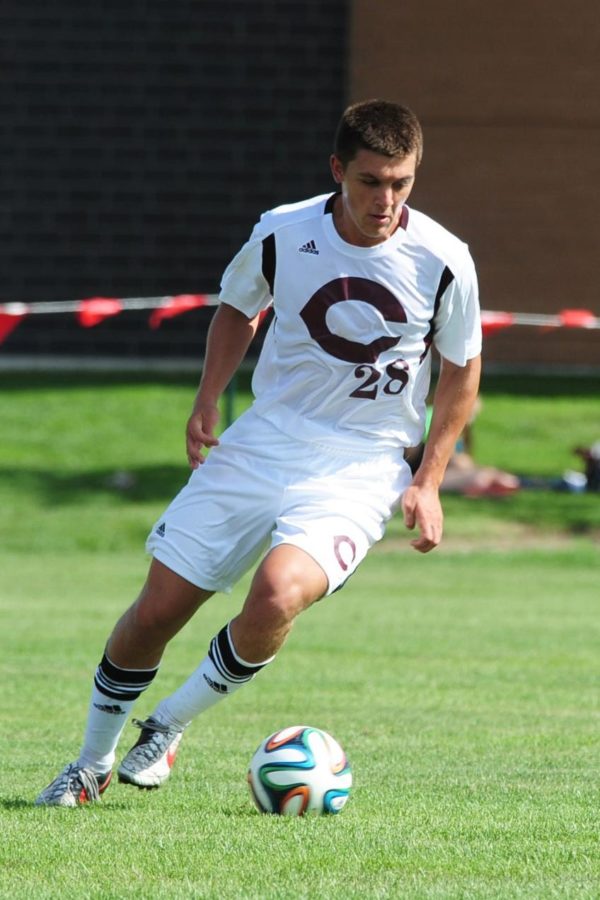Chicago Maroon: When did you start playing soccer?
DJ Weis: I actually started playing competitive soccer when I was 11 years old, so, not that early.
CM: What did you do before that? Any other sports?
DW: I was mostly a baseball player.
CM: Why did you end up going the soccer route?
DW: I randomly got called to a club team in our area that was forming, and I just found the game much more dynamic. Constant motion, constant activity, it was just a lot more enjoyable for me than sitting half of my time on the bench.
CM: What was your experience like playing in high school? When did you figure out you wanted to play in college?
DW: I think right away. I think before I went to high school I was already glancing at where I’d want to go to school, what my dream schools were, and just as time went on, I think, it just narrows the focus of where you want to go. But I always dreamed of playing college athletics.
CM: What’s it like being a student athlete on this campus? It seems pretty unique, even in the DIII world.
DW: Yeah, I absolutely love it. I think getting up every day, having a team to be a part of, having a regimented schedule for practice and always kind of having that in the back of your mind, having that as a break, or having that as something fun to do is a great thing to be a part of. And it takes my mind off of classes sometimes, it helps me through the day, and it gives me a group of guys that I can be really close with for a base. And it’s something I look forward to every day when I wake up.
CM: What’s on your mind when you’re playing, then?
DW: The game. There are games where I’ll have family members in the stands who say, “Did you see me?” or, “did you hear me?” and I’ll have no recollection of it. It’s entirely 100-percent focus on what’s going on in the game. And it has to be. I think the best piece of advice I’ve ever gotten from another player was to be the best you can be; you have to be focused from the time the whistle blows to the time the game ends—there are no breaks. It works very well for me.
CM: Have you always had that focus? Or is that something you’ve developed?
DW: Developed, for sure. It’s hard to be focused for 90 minutes of a game. You get tired, you get breaks, if you’re not playing well you doubt things, you make mistakes, and it can take your mind off the game. That’s definitely something that develops with time and experience and definitely something that’s not easy to find or maintain.
CM: What’s your favorite aspect of the game?
DW: I mean, being a defender, I personally love defending. I love the challenge of having a guy going at you and just kind of one-on-one defending, really. When it’s just you and the forward and he’s got a lot of space and he’s trying to duke you out and beat you, and it’s just you and him trying to find out who’s going to be stronger in that one situation. I think that’s probably one of my favorite parts.
CM: Do you see it as an individual sport, broken into parts, then?
DW: No. I think that’s just a unique aspect that I enjoy, that rare occasion when it happens. I definitely see it more as a team sport and I never consider myself an individual on the field, I definitely feel part of a team.
CM: Do you follow pro soccer? What do you follow?
DW: Manchester United is my favorite team, struggling right now. In America, in the MLS, I also follow the L.A. Galaxy, my hometown team. It’s playoff time; we need to beat RSL [Real Salt Lake] this weekend. But other than that, those are pretty much my two favorite teams.
CM: How do you feel about how soccer is viewed in this country? Sometimes it gets thrown aside, except in World Cup years, and then there’s a whole narrative of the country only caring in those years. How do you feel about that, as a player?
DW: It can be frustrating, but it’s getting a lot better. When I talk to random people who know about European teams or Manchester United or are watching global soccer or watching the MLS, it’s gotten a lot bigger since I started seriously playing, since I started high school. And that’s a very encouraging trend. And from what I can tell, it’s only going to continue. So I’m very excited about the potential that soccer has, and hopeful that I can maybe help in some way later on.
CM: In what way do you want to help that?
DW: I’m not sure, but I’d be open to almost anything. I think a coaching role sometime later in my life, if I can find the time, would definitely be something I’d enjoy. Especially at the youth level. But whatever role, opportunity, or occasion I can be a part of to help grow the sport, I would definitely take in a heartbeat.
CM: Do you think your fanaticism is linked to your playing, then? In the way you view the game?
DW: It was just something I wasn’t very aware of. And my first coach introduced me to it. And liking the sport as much as I did, it just caught right on.









